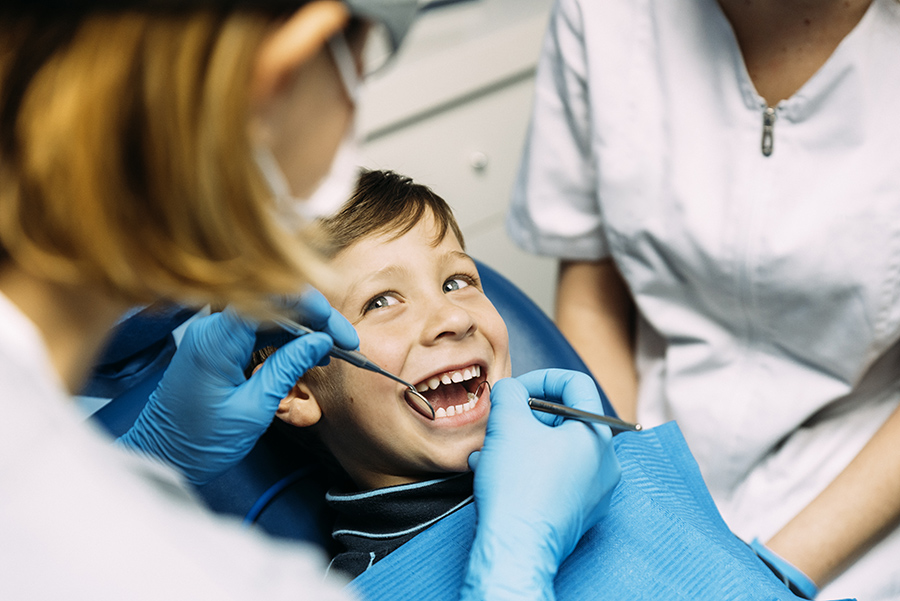Yes, but it is more than that, pediatric dentistry is a specialty that will work with children from birth.
A child is not a young adult and therefore should be treated differently. Behavior, understanding, language and fears need to be managed and baby teeth are not treated in the same way as permanent teeth, which is why the role of the pediatric dentist is so important.
Can we say that pediatric dentistry is the preventive branch of dentistry?
There is no doubt that prevention of any disease should begin in the first stage of life, leading to the creation of healthy habits. Pediatric dentistry is largely responsible for giving children and parents the tools to enjoy good oral health throughout their lives. The primary premise of a pediatric dentist should not be to treat disease but rather to devote his or her effort to preventing it. There is still a long way to go.
Is it true that you need prevention even during pregnancy?
As we said previously, prevention must begin as soon as possible. If we take into account that the beginning of the formation of baby teeth begins in the sixth week of intrauterine life, we will understand the importance of avoiding risky behaviors during pregnancy such as tobacco, alcohol, or medications… which can affect the formation. To dental organs, among other damages. This should be reported to pregnant mothers; In addition to explaining that pregnancy causes a series of hormonal changes that can affect your oral health and suffer, for example, from more bleeding gums.
Undoubtedly, the overall health and good oral health of the mother will prevent the baby’s development from being disturbed in some way. In addition, it is a good time to give parents good habits when their baby is born.
Does breastfeeding for long periods cause tooth decay?
Breastfeeding has many benefits for both mother and baby. At the oral level, breast sucking helps develop the jaws, determines the correct position of the dental arches, facilitates nasal breathing and the correct position of the tongue, and even prevents habits such as digital or pacifier sucking.
Breast milk, because it contains lactose, is carcinogenic like other sugars consumed in the diet. However, we must remember that the main factor for the appearance of early cavities is, apart from sugar intake, poor dental hygiene. For this reason, if breastfeeding is required during the night after the age of 6 months, in addition to not brushing the baby’s teeth after feeding, the baby will be more susceptible to developing cavities.
But we have to think the same way with babies who take bottles. From the eruption of the first tooth, night bottles should be avoided or dental hygiene should be performed afterwards. Bottle use should be limited to 12 to 18 months of age, and from now on try to get the baby to drink all the liquids in a cup.
Now that we get to this… should we talk about the pacifier? with or against?
A pacifier is a comforting device for many babies, especially in the first months of life and can prevent the thumb sucking habit. It is important to choose the right pacifier, the nipple should be anatomical, sized according to age, clean and changed frequently. However, pacifier use should be limited to 18-24 months of age as there is a strong association between habit and tongue position which can cause malocclusion, i.e. a change in the bite.
You were talking about thumb sucking. How can we eliminate this habit?
As you can imagine, getting rid of the thumb sucking habit is much more difficult than removing a pacifier. We have tools to help children quit smoking of their own volition, always with positive reinforcement, accompaniment and reward. But sometimes it is necessary to resort to some oral appliances that prevent the child from putting his finger in his mouth. A child who sucks his finger after the age of three will be invited to visit a pediatric dentist and look for the best way to get rid of this habit in a timely manner.
Why is it so important to keep baby teeth… if we’re going to replace them with new ones anyway?
Because a cavity-free mouth in childhood is directly linked to a healthy mouth in adulthood. In addition, baby teeth will allow you to chew and speak properly, maintain space for permanent teeth and guide their eruption, and stimulate the growth of the bones of the upper jaw and lower jaw. If there is an infection in one of the baby teeth, the permanent teeth underneath it can be affected.
Because a healthy smile helps develop a child’s self-esteem.
Do Catalan children have good oral health in general?
Cavities are considered one of the most common problems among school students, ahead of diabetes or obesity. In fact, this is the most common chronic disease of childhood. Almost half of Catalan children suffer from tooth decay and this is a fairly large percentage.
Is the current human diet the reason for the appearance of caries at this first stage?
When food is eaten, ingested sugars that remain in the mouth are broken down by bacterial plaque (a group of microorganisms, Streptococcus mutans being the most abundant) and acids are produced that lower the pH inside the mouth. This acidity attacks tooth enamel, demineralizing it. Our saliva is able to raise and balance the pH inside the mouth, restoring minerals to the enamel. If the purification process prevails in this balance, caries will occur.
It will be a confluence of several factors that will produce this condition. Eating fermented carbohydrates (sweets, milk, sugars…) and bacteria that produce acids makes the teeth more susceptible to infection, the frequency of exposure of the teeth to acidity, and above all the quality of oral hygiene.
We cannot deny that today’s food is very rich in sugars and we have to make an effort to escape from this food industrialization and provide our children with healthy food.
Why are our teeth so brittle?
Tooth enamel is certainly the hardest structure in the body thanks to a mineral called hydroxyapatite. But at the same time, it is very fragile and scratches easily. What’s more, if it wears out or breaks, it is the only tissue that does not regenerate on its own. Hence the importance of good daily oral hygiene, as we ensure that the enamel does not lose its resistance.

“Infuriatingly humble social media buff. Twitter advocate. Writer. Internet nerd.”



